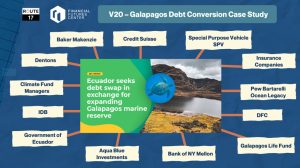In Southeast Asia, several countries are already exposed to socio-economic and financial losses induced by physical climate risk. Some Southeast Asian countries exposed to physical risk, such as Indonesia, are also leading producers and exporters of fossil fuels. This compounds the country’s climate impacts by exposing them transition risk, or a situation in which climate policies and regulations are introduced in a late and sudden way.
In a new technical paper from the Task Force on Climate, Development and the International Monetary Fund, Régis Gourdel, Irene Monasterolo and Kevin P. Gallagher analyze the macro-financial relevance of spillover risk in Indonesia, providing a quantitative assessment of such impact on the country’s fiscal and financial stability. As a main importer of Indonesian coal, the authors analyze how China’s drop in coal demand would affect the economic and financial performance of Indonesia’s fossil fuel sector, as well as the indirect effects on gross domestic product (GDP), employment, balance of payments and debt-to-GDP ratio. Critically, the paper provides an operative framework through which the International Monetary Fund (IMF) can trace the channels of spillover risk and provide quantitative assessments in their Financial Stability Assessment Programs (FSAPs).
Key findings:
- There is a trade-off between sovereign risk and decarbonization in Indonesia.
- A reduction in coal demand from China leads to lower emissions, though it does not fall enough to meet Indonesia’s climate target.
- The downturn in Indonesia’s mining sector will result in higher unemployment, lower GDP, lower public revenue and a higher debt-to-GDP ratio. The decrease in coal demand from China translates into a 6 percent drop in Indonesia’s GDP by 2050.
- At the regional level, the coordinated introduction of policies for the low-carbon transition in the Southeast Asia region, and support from regional institutions, could help countries smooth the negative effects of the spillover risk in the economy and public finance.
- At the global level, the IMF has a significant role to play. Efforts to model macro-critical climate risks should be incorporated in various parts of the IMF toolkit to guide its advisory functions in two key ways:
- Helping member countries design financial and fiscal policies to support climate resilience, adaptation and green structural transformation that minimizes risks for stability and balance of payment concerns.
- Helping the IMF pinpoint the kinds of financial packages it may need to help member states prevent and mitigate the impacts of transition spillovers on member-state economies.




